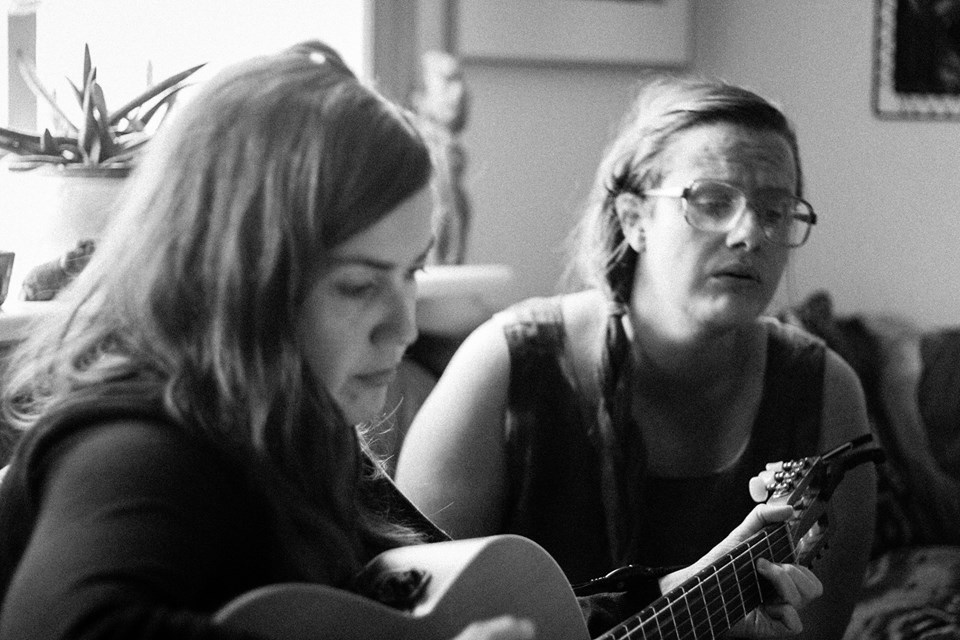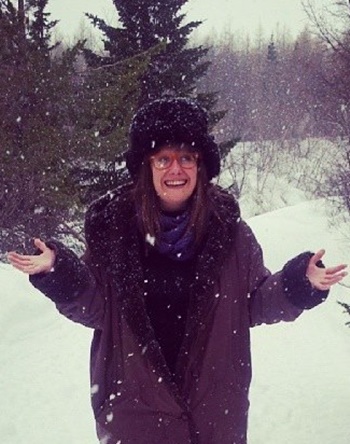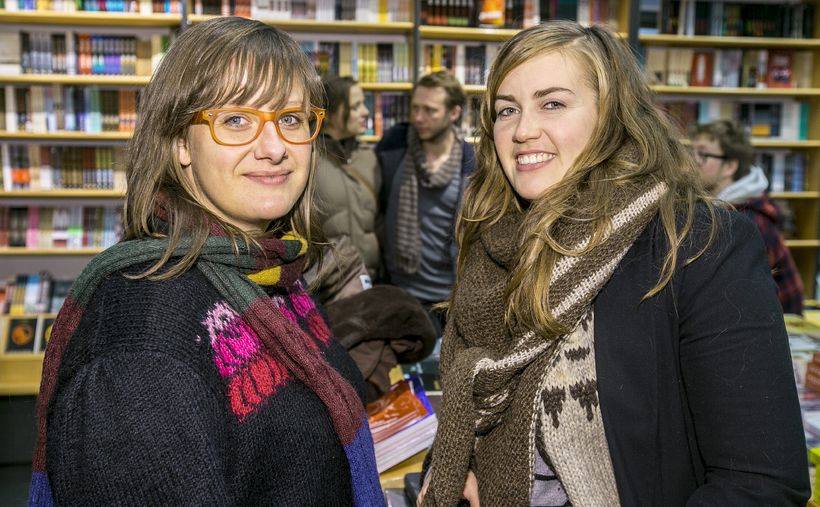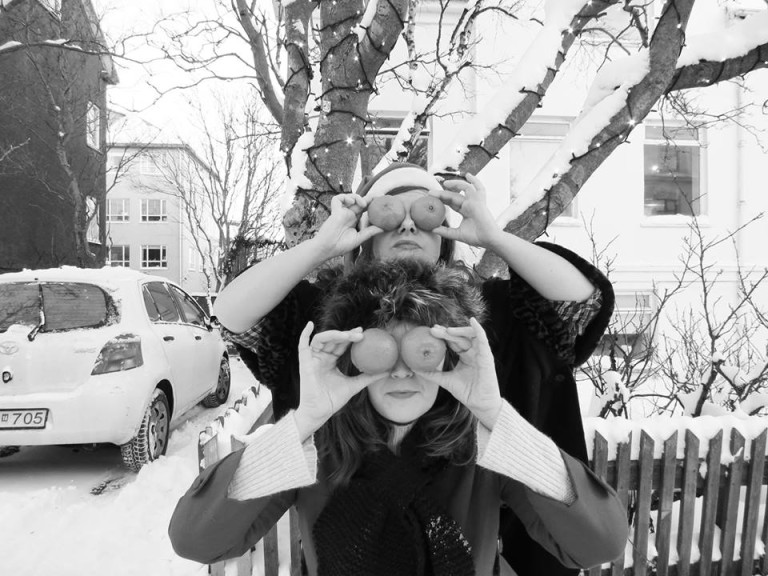2016 marks the 30th anniversary of “Söngvakeppni sjónvarpsins”, Iceland’s pre-selection competition for Eurovision. Among this year’s exciting contestants are first timers Vala Höskuldsdóttir and Sigríður Eir Zophoníasardótir – known together as the band Eva – who say that they’re bringing a political message to the contest. I caught up with Vala and started by asking, how it came about that the two of them decided to compete in it.

“It was a kind of an epiphany. We just got an office space and we were a bit lost in regards to what to do with it. And then we got a chance to think outside the box. We have this whiteboard at our office where we list the band’s upcoming projects and ideas and one day Sigga [a.k.a. Sigríður] simply wrote: “Write a Eurovision song”. Then she admitted to having had this dream for years, to perform at the Eurovision Song Contest.”
Was this also a dream of yours?
“No, not really. I have already experienced reality TV when I was 18 years old and took part in The Icelandic Idol. I felt it was total craziness, so for my being it was hard to dream about doing something like that again. But Sigga has promised to take good care of me and we’re all grown up now so I believe things will be different this time.”
Wait, so you’re saying that the pre-contest is basically reality TV?
“Well, theoretically speaking it is. I mean for someone like me, who comes from the world of theater, Eurovision is television entertainment and just as much reality TV as The Bachelor or Survivor. Which can be fun, and if it’s on good terms then we’re happy to be a part of it.”
“Eurovision has often been a platform for politics, although Iceland hasn’t taken great part in that panel so far. We’ve been focusing more on the love ballads…”
Vala tells me that after she and Sigga started talking about this – seriously talking – they decided that if they were going to compete, then it had to be on their terms and it had to have a point. So they asked themselves: What does Europe need to hear?
“And for us that question had an easy answer. The first thing that came to mind was the problem we’re facing in regards to refugees. And that problem is ours, not the refugees’. We have problems accepting people who are looking for safety. We need to stick together now and try to look at things from a different perspective. If we weren’t so scared, we might see that this doesn’t have to be such a problem. The song is basically about that.”
The matter of refugees has been much disputed all over Europe – how do you imagine the song will be received?
“I don’t know. It will be interesting to see, if a big percentage of Eurovision fans are afraid of the migrants and refugees of Europe.
I find it rather likely that more songs in the final contest will be addressing this problem. Eurovision has often been a platform for politics, although Iceland hasn’t taken great part in that panel so far. We’ve been focusing more on the love ballads, with the memorable exception of Pöllapönk who sang away prejudice.”

Well, it will be exciting to see if you’re right, if performers from other countries feel the urge to confront the situation. But why did you see Eurovision as platform for that?
“Well we recently published a song called “Makríllinn” [e. The Mackerel], which was inspired by a speech that Halldóra Geirharðsdóttir [an Icelandic actress] gave at the Gríma ceremony [Icelandic theater awards], where she talked about how important it was to use every window you get – every opportunity – to say what has to be said. And Eurovision is such an obvious window of opportunity.”
Talking about your work and your band I noticed that in the beginning you mentioned the band’s “office”, where you have this whiteboard for the band’s – not only gigs – but “projects”. So do you perhaps see yourselves as something more than a band?
“We have difficulties putting ourselves in a box – at least we haven’t found the right one yet. We both come from the theatre and are interested in politics. But we’re also just a band of two women. It’s complicated. And the same goes with the music itself. We’ve tried to pinpoint it, and so far the best description is ‘a country based,melodic feminst pop-punk with a witty, folkie undertone’. But you’re right, we definitely see ourselves as something more than a band.”
“At one point we wanted to have the lyrics translated into Arabic – that would have been fun!”
Your popularity has increased a lot over the last year. I have a feeling that the lyrics have much to do with this, do you agree?
“Yes. I think we’re a bit different when it comes to our lyrics. Our melodies are nice but the lyrics speak to people. And maybe that’s what’s missing in music today; lyrics that speak directly to the people. Our concerts are more like a conversation with the audience. We want to write songs that unite people.”
This seems to be a bit up and coming in art today, at least here in Iceland, sincerity infused with a bit of comic criticism.
“Definitely. I feel like that’s the best way to people’s hearts, to play both ways – to both admit you’re a part of society and also point out the comic and tragic sides of it.”

Can you tell us a bit about your song, “Ég sé þig” (i. I see you), for the song competition?
“I’m really happy about it. It paints a beautiful picture of what Europe could be looking at if we step up our game and start welcoming everybody. Multiculturalism is profitable in so many ways – it adds spice to life. And the song talks about how we’re all so different but at the same time we’re all in the same boat, which we don’t want to sink.”
In the pre-selection competition all songs must be performed in Icelandic. But have you already translated your songs into English, or do you have different plans?
“We’ve discussed this back and forth. At one point we wanted to have the lyrics translated into Arabic – that would have been fun! But at the end of the day we came to the conclusion that since the lyrics are a very important part of the song, it would be best for it to be performed in English since it would reach most people that way.”
Speaking about the song’s message, what are your thoughts on the statement that people who want to have boarders opened, ‘are not thinking things through’, that they ‘are simple minded’?
“Living together, and being a part of society, will always be complicated. Each society is filled with minefields. We need to dare to deal with things, tackle each other and find ways to disarm those mines. That’s life. It’s also very complicated to only live with Icelanders. I think it’s really complicated to live with a lot of groups of our society. But that doesn’t mean it’s not worth it.”

All photos/courtesy of the band Eva.


